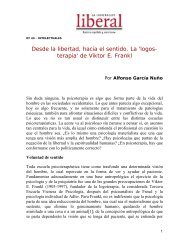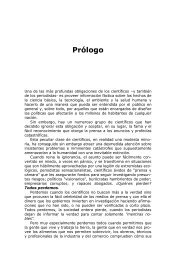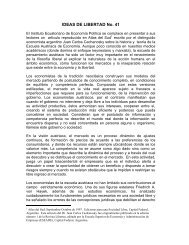Darfur: Blueprint for Genocide - Archipielago Libertad
Darfur: Blueprint for Genocide - Archipielago Libertad
Darfur: Blueprint for Genocide - Archipielago Libertad
You also want an ePaper? Increase the reach of your titles
YUMPU automatically turns print PDFs into web optimized ePapers that Google loves.
SECTION 5<br />
Ending Impunity 80<br />
Justice is often perceiv ed as a post-conflict issue.<br />
Impunity, though, in a genocidal situation is a brother to<br />
insecurity; both tell the perpetrator that there is insufficient<br />
resolve or politicalwill to stop genocide.<br />
Indeed, <strong>Darfur</strong> is just one more instance in Sudan’s circle<br />
of v iolence and impunity. Perpetrators of previous<br />
atrocities in the Nuba mountains in 1992 and in the<br />
Western Upper Nile oil fields in the late 1990s have not<br />
been brought to justice and some of the leading figures<br />
who directed these events are now directing policy on<br />
<strong>Darfur</strong>. 81<br />
5.1 Who is in control?<br />
Hav ing returning from <strong>Darfur</strong> at the beginning of June<br />
2004, the UK Secretary of State <strong>for</strong> International<br />
Dev elopment, Hilary Benn said, "There is no doubt that the<br />
GoS bears the primary responsibility.” 82 He also said in<br />
answer to questions in Parliament that, “those who have<br />
committed these atrocities should be called to account <strong>for</strong><br />
what they have done.” 83<br />
Mr Benn’s gut reaction and passion<br />
<strong>for</strong> action against the GoS clearly<br />
was not shared by everyone in Her<br />
Majesty ’s Government. Since June<br />
of 2004, the FCO has been careful to<br />
place blame <strong>for</strong> the atrocities on the<br />
Janjaweed militia, not the GoS.<br />
Neither has any UN resolution stated the responsibility of<br />
the GoS <strong>for</strong> the atrocities.<br />
Some, arguing in favour of Khartoum, conclude that the<br />
ev ents in <strong>Darfur</strong> are out of the control of the GoS – ev en<br />
though the crimes areso highly organized and systematic.<br />
80 This chapter is an adaptation of an article published in the Aegis<br />
Review on <strong>Genocide</strong> (Summer/Autumn 2004).<br />
81 Justice Africa,“Briefing June-July 2004” ,<br />
http://www.justiceafrica.org/July04.htm [Accessed 23 October 2004].<br />
82 Briefing at the House of Commons, 18 June 2004, at which Aegis<br />
was present.<br />
83 Answer to a question in Parliament from Rev. Martin Smyth MP<br />
(UUP), Hansard, 9 June 2004, Column 283.<br />
‘Impunity…in a<br />
genocidal situation<br />
is brother to<br />
insecurity.’<br />
In a failed state, it is possible that order is lost at a v ery<br />
high level – at such a high level that individuals have<br />
enough power to control certain events or territories.<br />
How ever, this is not a reason to allow impunity. On the<br />
contrary, control is lost, in part, because people do not fear<br />
accountability . In such a case, impunity contributes to the<br />
anarchy of a failed state, which allows crimes against<br />
humanity and genocidal acts to occur.<br />
How ever, in most countries, the use of the air <strong>for</strong>ce to<br />
support crimes against humanity would indicate<br />
Gov ernment culpability. The intervention of the Vice<br />
President, Ali Osman Taha, in the release of Janjaweed<br />
leader Musa Hilal to lead the Janjaweed points to<br />
Gov ernment culpability at the highest level. Musa Hilal had<br />
prev iously been imprisoned <strong>for</strong> mass killings. 84<br />
So, whether it is genocide organized by central<br />
Gov ernment or powerful individuals w ithin the governing<br />
structure in Khartoum, a referral to the ICC would help to<br />
bring future stability. The prosecutor’s office of the ICC<br />
would not be interested in accusing or indicting the GoS. It<br />
is interested in the individuals responsible <strong>for</strong> these crimes<br />
– whether they represent the Government or not.<br />
5.2 Countering the genocidal threat<br />
with judicial process<br />
Foreign Secretary Jack Straw said on 7 September “We<br />
want an end to that climate of impunity and we there<strong>for</strong>e<br />
support proper international investigation of all the<br />
ev idence about w hat international<br />
crimes have been committed…and<br />
by whom.” 85<br />
Already, report after report from<br />
within the UN, the US State<br />
department and numerous human<br />
rights groups found the GoS culpable<br />
<strong>for</strong> these crimes. These led US<br />
Secretary of State Colin Powell to re-state on 9 September<br />
2004, “We concluded that genocide has beencommitted in<br />
<strong>Darfur</strong> and that the GoS and the Jingaw eit bear<br />
responsibility – and genocide may still be occurring." 86<br />
Documentation is the first step in bringing about<br />
accountability . The ef<strong>for</strong>ts of the US State Department,<br />
84 Wax , E. (2004). “ Janjaweed Leaders Describe Campaign against<br />
Africans as Self-Defence” , Washington Post, 18 July 2004.<br />
85 Hansard, 7 September 2004, Column 619.<br />
86 United States State Department (2004), “ The Crisis in <strong>Darfur</strong>” ,<br />
http://www.state.gov/secretary/rm/36042.htm [Accessed 16<br />
November].<br />
28




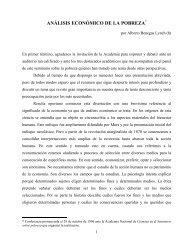
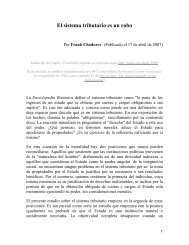
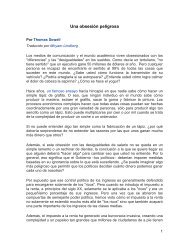
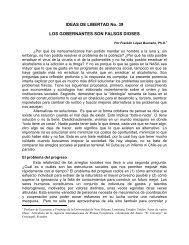
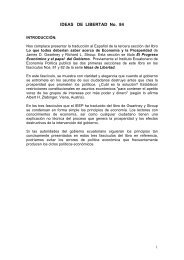
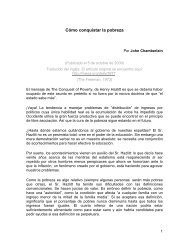
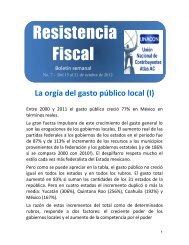
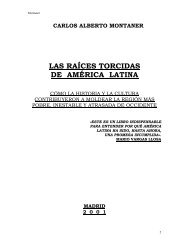
![0091 Stewart - La magia y el misterio del comercio [parte I].pdf](https://img.yumpu.com/16943279/1/169x260/0091-stewart-la-magia-y-el-misterio-del-comercio-parte-ipdf.jpg?quality=85)
